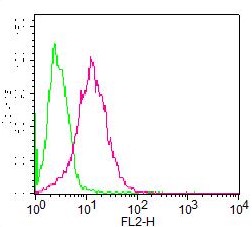Monoclonal Antibody to human TLR4/MD-2 (Clone : 18H10)
Catalogue Number: 10-3520-ABO
| Manufacturer: | Abeomics |
| Shelf Life: | 12 months |
| Type: | Monoclonal Primary Antibody - Unconjugated |
| Alias: | Lymphocyte antigen 96, ESOP-1, LY96 |
| Shipping Condition: | Blue Ice |
| Storage Condition: | 2-8°C |
| Unit(s): | 500 ug, 100 ug |
| Host name: | Mouse |
| Clone: | 18H10 |
| Isotype: | IgG2b |
| Immunogen: | TLR4/MD-2 expressing CHO cells/ chimeric TLR4/MD-2 fusion protein |
| Application: | FACS, FA |
Description
Description: The monoclonal antibody 10-3520 reacts with MD-2, an accessory molecule of the Toll-like receptor 4 (TLR4, CD284). TLRs belong to a family of proteins that specifically recognizes and senses microbial products. They are highly conserved throughout evolution and act as innate immune recognition receptors against many pathogens. TLR4 is a functional receptor for gram-negative bacterial lipopolysaccharides (LPS). TLR4 associates with MD-2 which is absolutely required for LPS-induced activation of TLR4. MD-2 exists as a cell surface protein in association with TLR4. It also exists as secreted forms consisting of MD-2 monomers and multimers (sMD-2). Circulating sMD-2 is mainly present as a doublet of ~20 and 25 kD, representing differentially glycosylated forms. Unlike TLR4, sMD-2 binds directly LPS without the need of soluble CD14 (sCD14). However, LPS-MD-2 interactions are increased when LPS is pretreated with CD14. Only monomeric sMD-2 is biologically active and able to associate with TLR4 and LPS. sMD-2 circulates in plasma of healthy individuals as a non-active, polymeric protein. In septic plasma, the total amount of sMD-2 was strongly elevated and contained both sMD-2 polymers and monomers. Soluble MD-2 is proposed to be an important mediator of organ inflammation during sepsis. During experimental human endotoxemia, the monomeric and total sMD-2 content in plasma increased with the kinetics of an acute phase protein. This parallels enhanced TLR4 costimulatory activity. In vitro studies revealed that sMD-2 release appears to be restricted to endothelial and dendritic cells. The monoclonal antibody 18H10 reacts with MD-2. However, it does not react with sMD-2. In addition, the monoclonal antibody 18H10 is able to inhibit bacterial binding to MD-2.
Additional Text
Gene Name
LY96
Gene ID
23643
Uniprot ID
Q9Y6Y9
Antibody Clonality
Monoclonal

